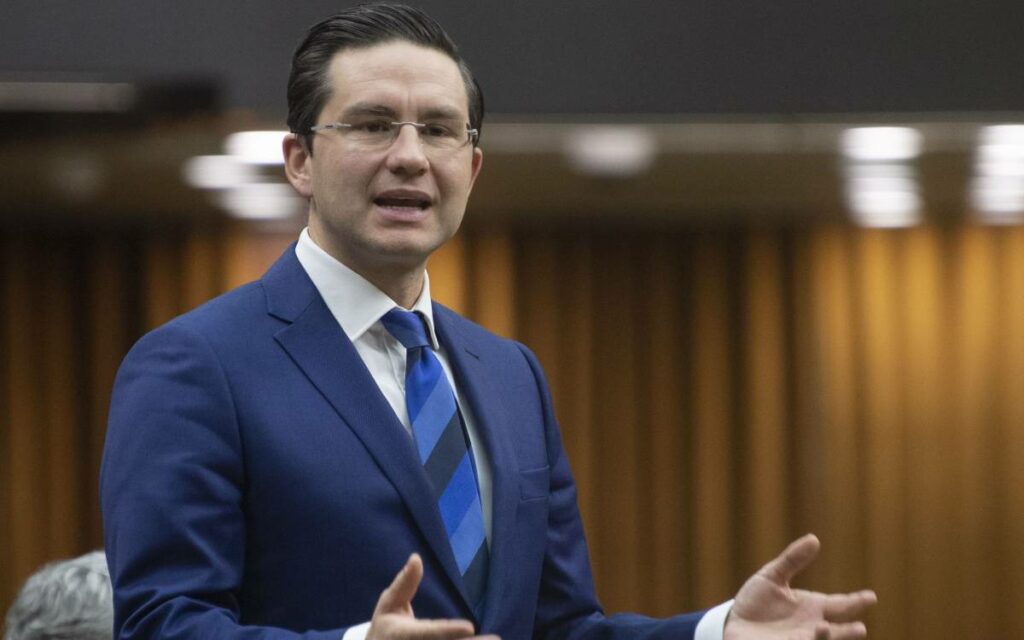
Conservative Party leadership front-runner Pierre Poilievre. Photo credit: The Canadian Press/Adrian Wyld
Politicians spent the last two years giving themselves pay raises while the rest of us suffered through pay cuts, tax hikes, inflation and restrictions.
The insult to injury? It’s the increasingly well-heeled politicians who are responsible for the pain many everyday Canadians are going through.
Folks can’t afford to fill their vehicles, they’re struggling to pay for their groceries and they’re watching interest rates take off. All while the fat cats in Ottawa get fatter.
Conservative Party leadership candidate Pierre Poilievre says he knows this is a problem.
“Trudeau thinks he’s your boss,” said Poilievre. “He’s got it backwards, you’re the boss.”
During Poilievre’s Conservative Party leadership campaign, he has claimed he wants to put “you back in charge of your life” and build a Canada where “the government is servant, not master.”
Here’s how Poilievre can really put the people back in charge: recall and referendums in Ottawa.
If the people are the boss, then the people should be able to routinely give politicians pink slips for poor performances.
If government belongs to the people, then the people should be able to repeal public policy if it goes against our wishes. A national recall and referendum law would go a long way in reaffirming the role of citizen as the boss.
Here’s how it can work:
Recall would empower displeased voters to launch a petition in their riding. If that petition gets enough signatures, it triggers a byelection in that riding. The member of Parliament would then either re-run for their job in the byelection or resign if they reckon they can’t win back the seat.
It’s a grassroots performance check on a job and every single MP would be subject to it.
Referendum laws, often called citizens’ initiative, work in a similar way. People could introduce or axe legislation if enough people vote to make it happen. Holding a referendum could have empowered Canadians to stop the latest carbon tax hikes, or outlaw the incoming second carbon tax.
Canada is no stranger to this form of direct democracy.
British Columbia first implemented recall and referendum laws in 1995 and it has been used successfully. B.C. MLA Paul Reitsma got caught sending fake letters-to-the-editor and resigned when it became clear that enough signatures had been collected to recall him. When the B.C. government tried to raise taxes while harmonizing provincial and federal sales taxes, voters forced a referendum and defeated the legislation.
Alberta introduced recall and referendums in 2021 and extended recall to the municipal level. As Premier Jason Kenney noted, being able to fire politicians between elections puts “voters back in the driver’s seat.”
While not directly triggered by provincial recall and referendum laws, the big vote in Calgary gave people the ability to strike-down the city’s winter Olympic bid boondoggle. In B.C.’s Lower Mainland, voters turned-down a new transit tax.
Many countries have national recall and referendum laws.
“The origins of the institution can be traced back to the Roman Republic, where tribunes were occasionally recalled,” according to the 2018 Routledge Handbook to Referendums and Direct Democracy.
In addition to about half of the American states having some form of recall and referendum laws, there are 19 countries that have national recall, according to the Routledge Handbook. About three dozen countries allow citizens to use direct democracy to influence laws.
With many examples to choose from, Canada’s federal recall and referendum rules can strike the right balance between greater accountability and ensuring spiteful political chaos doesn’t ensue.
Poilievre is right on the money when diagnosing the problem. Canadians are supposed to be the boss, and we need more control over our politicians. One of the solutions to Ottawa’s accountability problem is national recall and referendum laws.
This column was first published by the Western Standard on Aug. 6, 2022. Reprinted here with permission.
Franco Terrazzano is the Alberta Director for the Canadian Taxpayers Federation.






